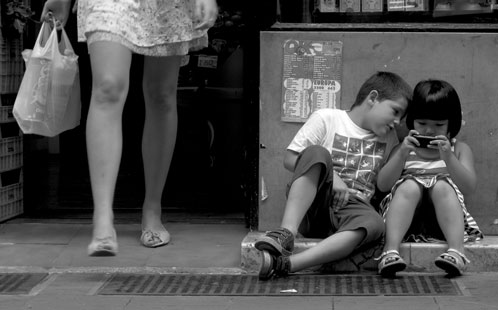United Nations Rights of the Child in the Digital Age

As the United Nations considers updating the Convention on the Rights of the Child to take into account digital technology, a new report is calling for a more balanced approach to online policies that not only protect young people, but also empowers them to form their own opinions on harnessing their rights in the digital world.
The international research, led by Associate Professor Amanda Third from the Institute for Culture and Society, and the Young and Well Cooperative Research Centre, was drawn from interviews with children from 16 countries around the world. The findings are being presented to the United Nations Committee for the Rights of the Child in Geneva, Switzerland.
In the study, 148 children from the ages of 6 to 18 participated in workshops where they undertook a series of activities to reflect on their rights as children in the digital age.
"Children increasingly see digital media as crucial to their rights to information, education and participation and don't see their digital rights as separate from their rights more broadly. They see the online world as simply another setting in which they interact," says Dr Third.
"We found that children from across the globe were not very good at being able to identify the opportunities that digital media provide for their rights. Adult-centred conceptions seem to dominate to the point where children have real trouble thinking about how they might leverage the benefits of digital media to enact their rights."
"In other words, in our efforts to ensure that children's right to be protected is upheld, we may in fact be curbing their right to participate, and subsequently formulate their own opinions and new ways to use technology."
"The research highlights a need to support children to develop their resilience by promoting digital literacy initiatives to foster their technical, media and social competencies."
Associate Professor Third says children who participated in this project talked knowledgeably about risks they may encounter online, yet the risks they identified were not necessarily ones of which they had direct or indirect experience.
"For example, children's direct references to cyberbullying remained few and far between, which suggests that cyberbullying does not preoccupy children to the same extent that it often features in public and policy debates," says Dr Third.
"This is not to suggest that cyberbullying is not a serious issue that needs to be addressed by policy and practice, rather it underlines the need for research that can better identify which children are more at risk of experiencing particular harms, so that resources can be used to more precisely target those who are most in need."
Importantly, Associate Professor Third says an awareness of the risks does not necessarily translate into behaviour changes that enable children to be safe online.
"Children must be given the opportunity to think critically and develop their own language and strategies, otherwise they will be unable to develop resilience when facing risks," she says.
Young and Well CRC CEO, Associate Professor Jane Burns, says it is essential for young people to have a voice in the debate that explores the impact of digital access and their rights.
"I'm excited that the Young and Well CRC was able to partner with the Berkman Center for Internet and Society at Harvard University and UNICEF to bring these voices to the UN Committee on the Rights of the Child to inform the Day of Discussion on children's rights in the digital age," says Associate Professor Burns.
"In hearing the sentiments of children from around the world, one truth resounded loud and clear: we need to take the necessary steps to ensure that all children can reap the opportunities of digital access, striking the balance between advancing their rights, while also ensuring their safety."
UNICEF Australia Young Ambassador and Young and Well CRC Youth Brains Trust member Philip Chan says "digital media is a powerful way for children to realise their rights".
"In any new policy or decision-making, it is absolutely important to listen to children's voices first-hand, rather than assuming what is best for them," he says.
17 September, 2014
Photo credit: Andrea Del Bono




